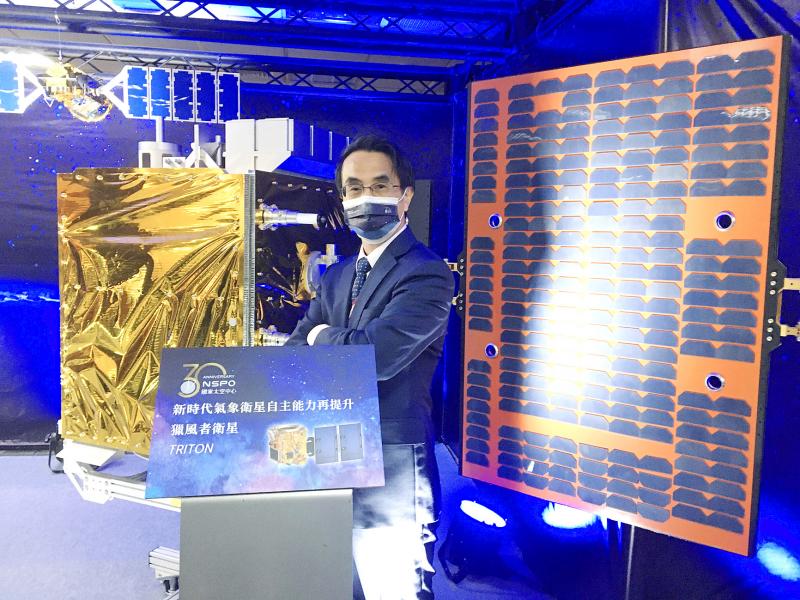Taiwan is seeking to become 80 percent autonomous in manufacturing key satellite components by 2025 and develop small launch rockets, National Space Organization (NSPO) Director-General Wu Jong-shinn (吳宗信) said yesterday.
Following the six-satellite Formosat-7/COSMIC-2 constellation’s launch in 2019, weather observation satellite Triton is scheduled to be launched next year, Wu told a news conference in Taipei to mark the agency’s 30th anniversary.
Meanwhile, the agency is working on the Formosat-8 project, which would comprise six remote-sensing satellites with a resolution of 0.7m each, Wu said, adding that its first satellite is set to be launched in 2023.

Photo: Lin Chia-nan, Taipei Times
“Hopefully, by 2025, the nation will be 70 to 80 percent autonomous in manufacturing key satellite components,” Wu said, referring to components in satellite buses and payloads.
Wu said that local space industry’s plans should focus on satellite communications equipment, satellite-related applications and space start-ups.
The agency is planning training courses with focus on certain industries on component testing and low-Earth orbit communications satellites, its Web site shows.
Hopefully, the agency would continue to support the development of sounding rockets and small launch rockets, Wu said.
Asked whether the agency has formal plans for developing rockets, Wu said that the promotion of rocket development is his personal vision, despite his role having no final say in space policy decisions.
The Executive Yuan in 2019 approved a third-phase space technology development program with a budget of NT$25.1 billion (US$899.3 million) until 2028.
The program is being revised, with the aim of facilitating more industry participation in space projects, and engaging more government agencies in fostering firms in the industry and local talent, Wu said.
The agency must become more appealing to recruit more talent at a time when some key employees are set to retire within the next five years, he said.
Meanwhile, the agency last month launched a new book reviewing its 30-year history, titled Formosats Launched into Space — A Trajectory for Taiwan Space Development (福爾摩沙飛向太空—台灣太空科技發展的軌跡), written by Wang Chi-lan (王季蘭).
The agency’s history has seen many ups and downs, including financial difficulties in 2007, when it could barely pay salaries, National Applied Research Laboratories president Wu Kuang-chong (吳光鐘) said.
It has overcome many obstacles and is expected to become more active after its reorganization, he said.
Quanta Computer Inc founder Barry Lam (林百里) said that supercomputing and hyper-connectivity communications technologies are key future trends, as well as the development of advanced chips by Taiwan Semiconductor Manufacturing Co.
While Taiwan has advanced hardware manufacturing, the nation should also seek to make breakthroughs in software development and become a “solution supplier,” Lam said.
Later yesterday, Wu Jong-shinn, Minister of Science and Technology Wu Tsung-tsong (吳政忠) and Hsinchu Science Park Bureau director-general Wayne Wang (王永壯) joined a delegation to visit Slovakia, the Czech Republic and Lithuania until Saturday next week.
“We hope to develop closer ties with them and create win-win situations,” Wu Tsung-tsong said.

Taipei has once again made it to the top 100 in Oxford Economics’ Global Cities Index 2025 report, moving up five places from last year to 60. The annual index, which was published last month, evaluated 1,000 of the most populated metropolises based on five indices — economics, human capital, quality of life, environment and governance. New York maintained its top spot this year, placing first in the economics index thanks to the strength of its vibrant financial industry and economic stability. Taipei ranked 263rd in economics, 44th in human capital, 15th in quality of life, 284th for environment and 75th in governance,

The Sports Administration yesterday demanded an apology from the national table tennis association for barring 17-year-old Yeh Yi-tian (葉伊恬) from competing in the upcoming World Table Tennis (WTT) United States Smash tournament in Las Vegas this July. The sports agency said in a statement that the Chinese Taipei Table Tennis Association (CTTTA) must explain to the public why it withdrew Yeh from the WTT tournament in Las Vegas. The sports agency said it contacted the association to express its disapproval of the decision-making process after receiving a complaint from Yeh’s coach, Chuang

Control Yuan Secretary-General Lee Chun-yi (李俊俋) tendered his resignation last night, admitting that he had misused a government vehicle, as reported by media. His resignation was immediately accepted by the Control Yuan. In a statement explaining why he had resigned, Lee apologized for using a Control Yuan vehicle to transport his dog to a pet grooming salon on May 20. The issue first came to light late last month, when TVBS News reported that Lee had instructed his driver to take the dog to the salon. The news channel broadcast photos that it said were taken by an unnamed whistle-blower, which purportedly showed the

A former officer in China’s People’s Liberation Army (PLA) who witnessed the aftermath of the 1989 Tiananmen Square massacre has warned that Taiwan could face a similar fate if China attempts to unify the country by force. Li Xiaoming (李曉明), who was deployed to Beijing as a junior officer during the crackdown, said Taiwanese people should study the massacre carefully, because it offers a glimpse of what Beijing is willing to do to suppress dissent. “What happened in Tiananmen Square could happen in Taiwan too,” Li told CNA in a May 22 interview, ahead of the massacre’s 36th anniversary. “If Taiwanese students or